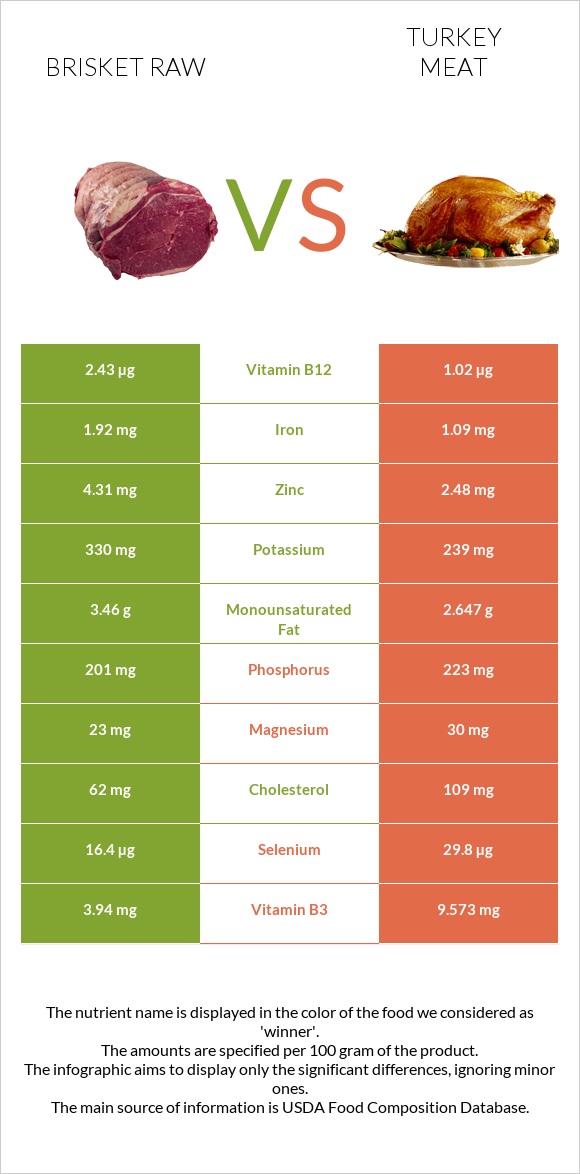Brisket raw vs. Turkey meat — In-Depth Nutrition Comparison
Compare
How are brisket raw and turkey meat different?
- Brisket raw is higher in vitamin B12, zinc, and iron; however, turkey meat is richer in vitamin B3, selenium, vitamin B6, vitamin B5, and vitamin B2.
- Daily need coverage for vitamin B12 for brisket raw is 59% higher.
- Brisket raw contains 2 times more iron than turkey meat. While brisket raw contains 1.92mg of iron, turkey meat contains only 1.09mg.
- Brisket raw has less cholesterol.
Beef, brisket, whole, separable lean only, all grades, raw and Turkey, whole, meat, and skin, cooked, roasted are the varieties used in this article.
Infographic

Infographic link
Mineral Comparison
Mineral comparison score is based on the number of minerals by which one or the other food is richer. The "coverage" charts below show how much of the daily needs can be covered by 300 grams of the food.
| Contains more PotassiumPotassium | +38.1% |
| Contains more IronIron | +76.1% |
| Contains more ZincZinc | +73.8% |
| Contains less SodiumSodium | -23.3% |
| Contains more MagnesiumMagnesium | +30.4% |
| Contains more CalciumCalcium | +180% |
| Contains more CopperCopper | +16.3% |
| Contains more PhosphorusPhosphorus | +10.9% |
| Contains more SeleniumSelenium | +81.7% |
Vitamin Comparison
Vitamin comparison score is based on the number of vitamins by which one or the other food is richer. The "coverage" charts below show how much of the daily needs can be covered by 300 grams of the food.
| Contains more Vitamin EVitamin E | +357.1% |
| Contains more Vitamin B1Vitamin B1 | +122.2% |
| Contains more Vitamin B12Vitamin B12 | +138.2% |
| Contains more Vitamin KVitamin K | +∞% |
| Contains more Vitamin AVitamin A | +∞% |
| Contains more Vitamin B2Vitamin B2 | +65.3% |
| Contains more Vitamin B3Vitamin B3 | +143% |
| Contains more Vitamin B5Vitamin B5 | +170.9% |
| Contains more Vitamin B6Vitamin B6 | +46.7% |
| Contains more FolateFolate | +28.6% |
All nutrients comparison - raw data values
| Nutrient |  |
 |
DV% diff. |
| Vitamin B12 | 2.43µg | 1.02µg | 59% |
| Vitamin B3 | 3.94mg | 9.573mg | 35% |
| Selenium | 16.4µg | 29.8µg | 24% |
| Zinc | 4.31mg | 2.48mg | 17% |
| Protein | 20.72g | 28.55g | 16% |
| Cholesterol | 62mg | 109mg | 16% |
| Vitamin B6 | 0.42mg | 0.616mg | 15% |
| Polyunsaturated fat | 0.23g | 2.119g | 13% |
| Vitamin B5 | 0.35mg | 0.948mg | 12% |
| Iron | 1.92mg | 1.09mg | 10% |
| Vitamin B2 | 0.17mg | 0.281mg | 9% |
| Vitamin B1 | 0.1mg | 0.045mg | 5% |
| Potassium | 330mg | 239mg | 3% |
| Phosphorus | 201mg | 223mg | 3% |
| Calories | 155kcal | 189kcal | 2% |
| Vitamin D | 15 IU | 2% | |
| Magnesium | 23mg | 30mg | 2% |
| Vitamin E | 0.32mg | 0.07mg | 2% |
| Vitamin D | 0.4µg | 2% | |
| Saturated fat | 2.59g | 2.155g | 2% |
| Monounsaturated fat | 3.46g | 2.647g | 2% |
| Calcium | 5mg | 14mg | 1% |
| Copper | 0.08mg | 0.093mg | 1% |
| Sodium | 79mg | 103mg | 1% |
| Vitamin A | 0µg | 12µg | 1% |
| Vitamin K | 1.3µg | 0µg | 1% |
| Folate | 7µg | 9µg | 1% |
| Fats | 7.37g | 7.39g | 0% |
| Net carbs | 0g | 0.06g | N/A |
| Carbs | 0g | 0.06g | 0% |
| Manganese | 0.014mg | 0.014mg | 0% |
| Trans fat | 0.101g | N/A | |
| Choline | 86.5mg | 87.4mg | 0% |
| Tryptophan | 0.232mg | 0.291mg | 0% |
| Threonine | 0.905mg | 1.004mg | 0% |
| Isoleucine | 0.931mg | 0.796mg | 0% |
| Leucine | 1.637mg | 1.925mg | 0% |
| Lysine | 1.724mg | 2.282mg | 0% |
| Methionine | 0.53mg | 0.724mg | 0% |
| Phenylalanine | 0.809mg | 0.903mg | 0% |
| Valine | 1.008mg | 0.902mg | 0% |
| Histidine | 0.709mg | 0.749mg | 0% |
| Omega-3 - EPA | 0g | 0.008g | N/A |
| Omega-3 - DHA | 0g | 0.005g | N/A |
| Omega-3 - ALA | 0.105g | N/A | |
| Omega-3 - DPA | 0g | 0.008g | N/A |
| Omega-3 - Eicosatrienoic acid | 0.001g | N/A | |
| Omega-6 - Gamma-linoleic acid | 0.003g | N/A | |
| Omega-6 - Dihomo-gamma-linoleic acid | 0.01g | N/A | |
| Omega-6 - Eicosadienoic acid | 0.014g | N/A | |
| Omega-6 - Linoleic acid | 1.841g | N/A |
Macronutrient Comparison
Macronutrient breakdown side-by-side comparison
Protein:
20.72 g
Fats:
7.37 g
Carbs:
0 g
Water:
70.29 g
Other:
1.62 g
Protein:
28.55 g
Fats:
7.39 g
Carbs:
0.06 g
Water:
63.52 g
Other:
0.48 g
| Contains more OtherOther | +237.5% |
| Contains more ProteinProtein | +37.8% |
| Contains more CarbsCarbs | +∞% |
~equal in
Fats
~7.39g
~equal in
Water
~63.52g
Fat Type Comparison
Fat type breakdown side-by-side comparison
Saturated fat:
Sat. Fat
2.59 g
Monounsaturated fat:
Mono. Fat
3.46 g
Polyunsaturated fat:
Poly. Fat
0.23 g
Saturated fat:
Sat. Fat
2.155 g
Monounsaturated fat:
Mono. Fat
2.647 g
Polyunsaturated fat:
Poly. Fat
2.119 g
| Contains more Mono. FatMonounsaturated fat | +30.7% |
| Contains less Sat. FatSaturated fat | -16.8% |
| Contains more Poly. FatPolyunsaturated fat | +821.3% |